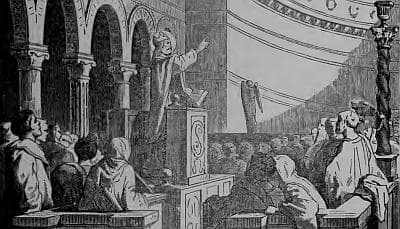Saint Barbatus of Benevento
Saint
Feast Day: February 19
Death: February 29, 682
Biography
Saint Barbatus of Benevento, also known as Barbas or Barbato, was born around the year 610 in Benevento, Italy. He displayed great devotion to his faith from an early age and became a priest at a young age. As a priest, he was known for his passionate preaching, which sometimes led to conflicts with his flock who found his zeal overwhelming. Eventually, due to the opposition he faced from his own parishioners, Saint Barbatus made the difficult decision to resign from his parish and return to his hometown. Upon his return, he witnessed a resurgence of pagan practices, particularly the worship of a golden viper and the hanging of animal skins in a tree, which were believed to bring good luck and ward off evil. Around the same time, the city of Benevento found itself besieged by the army of Emperor Constans, causing great distress among the locals. Saint Barbatus, undeterred by the previous conflict, began to preach against the paganism and idolatrous practices that had taken hold among the people. His words resonated with the populace, and they renounced their errors and embraced the Christian faith anew. Through his intercession and prayers, Saint Barbatus assured the people of Benevento that the siege would come to an end. Miraculously, the besieging army soon withdrew, putting an end to the threat that had loomed over the city. In a show of his determination to eradicate pagan beliefs, the saint personally cut down the tree that had been used for idolatrous practices and melted down the golden viper to create a chalice for use during the Mass. Impressed by his holiness and dedication, Barbatus was consecrated as the Bishop of Benevento on 10 March 663. In his new role, he became a tireless advocate for eradicating superstition and promoting true Christian faith throughout the state. His efforts were instrumental in converting many pagans to Christianity and restoring the diocese of Benevento to its full spiritual glory. Saint Barbatus' reputation as a devout and wise bishop reached Rome, and he was called upon by Pope Agatho to assist in a council held in the Holy City in 680. This council aimed to address theological disputes, especially regarding the heresy of Monothelitism, which denied the existence of two wills in Jesus Christ. Saint Barbatus' presence and guidance in the council were highly valued, and his wisdom helped to bring about a resolution. Subsequently, Saint Barbatus also participated in the Sixth General Council held at Constantinople in 681, where the teachings of the Monothelites were declared heretical. His active involvement in these ecclesiastical councils testified to his theological knowledge and commitment to safeguarding the true teachings of the Catholic Church. Saint Barbatus of Benevento passed away on 29 February 682 in Benevento, Italy, due to natural causes. His extraordinary life and numerous miracles led to a lasting veneration of his memory. Although he was not formally canonized through the process that exists today, Saint Barbatus of Benevento was acknowledged as a saint during the Pre-Congregation era. Throughout the centuries, Saint Barbatus has been honored as the patron saint of Benevento, Italy, both as a city and as a diocese. His courageous stand against paganism and his unwavering commitment to the Catholic faith continue to inspire and guide believers to this day. Feast days celebrating his life and contributions are observed on 19 February.
